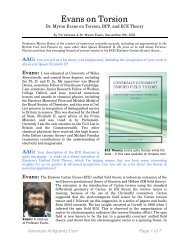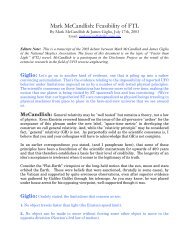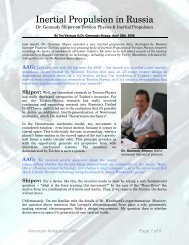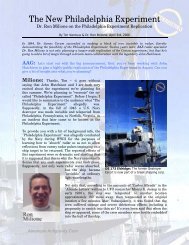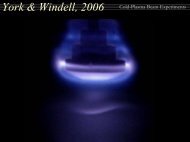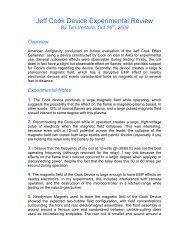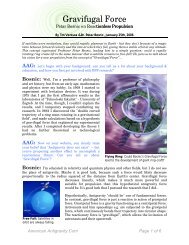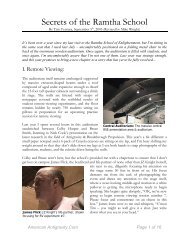Sharon-Weinberger-In.. - American Antigravity
Sharon-Weinberger-In.. - American Antigravity
Sharon-Weinberger-In.. - American Antigravity
Create successful ePaper yourself
Turn your PDF publications into a flip-book with our unique Google optimized e-Paper software.
interest in nuclear isomers, and the specific 1998 results that sparked the debate over the<br />
“hafnium bomb.” What is primarily at issue in my book is an experiment conducted in 1998 that<br />
led a scientist in Texas to claim he had “triggered” the hafnium isomer (hafnium-178m2) using<br />
photons from a dental X-ray machine. Those results could not be reproduced by independent<br />
researchers, and the initial claims violated some laws of physics. However, this does not cover<br />
the entire range of isomer physics, just the specific idea of a nuclear hand grenade based on the<br />
hafnium isomer.<br />
AAG: <strong>In</strong> "The Social Life of <strong>In</strong>formation", Brown & Duguid made an excellent point that<br />
technology stories like the hafnium-bomb or even the Philadelphia Experiment are part of an<br />
oral-tradition that's an ingrained part of the engineering & defense culture. They believe that<br />
stories like this stick around because they contain inherent information value, but that like any<br />
metaphorical tale, the information is often seriously diluted & misinterpreted over time. Any<br />
thoughts on how this might affect these "cutting-edge" technologies as they filter up from the<br />
engineering to the administrative levels in industry & government?<br />
<strong>Weinberger</strong>: I love that idea, truly. Oral<br />
traditions are a wonderful thing, and you may well<br />
be right about how those work. <strong>In</strong> a sense, the<br />
isomer bomb has been one of those stories: every<br />
few years nuclear weapons scientists would say,<br />
“Hey, wouldn’t isomers make for a great bomb?”<br />
Then the scientists would discuss it, realize the<br />
limitations, and (usually) move on.<br />
But the hafnium bomb should not be equated with<br />
all isomer research. That would be unfortunate.<br />
The idea is not to discourage truly forward thinking<br />
ideas, but to ensure that the ideas we do fund are<br />
grounded in reality (and science). I do hope the<br />
hafnium bomb becomes a reminder of why you<br />
don’t want to go off the deep end.<br />
Carl Collins: The hafnium researcher in his<br />
laboratory at the University of Texas.<br />
AAG: I'd like to broaden our scope just a bit from the book itself to some examples<br />
throughout the defense-industry. First, I'd like to touch on what I call "me too" technologies,<br />
which I guess would include Darpa's massive push towards <strong>In</strong>formation Technology solutions<br />
for any and every problem they come up against. They invented the internet, and IT certainly<br />
offers flashy solutions, but do you think that they're over-investing in IT simply because it gets<br />
them publicity to push initiatives in this area?<br />
<strong>Weinberger</strong>: Every DARPA director wants a legacy. I’ve heard, very second-hand, that<br />
the current director wants it to be cognitive computing, and DARPA has put a lot of investment<br />
into that area. At the same time, the New York Times ran an article some time back on DARPA’s<br />
cutbacks on university funding for IT. I can’t say which areas are over or under-invested in---I<br />
simply haven’t looked at the budget in that sort of detail. Though I’m sometimes critical of<br />
DARPA, I think its portfolio is likely balanced to reflect the current exigencies of war, and that<br />
may be quite reasonable.<br />
AAG: Speaking of which, the mother of all over-hyped "me too" technologies these days is<br />
nanotechnology. I probably don't even need to list examples (MIT's nanotech armor), but I<br />
should point out that the fundamental basis for Drexlerian nanotechnology - the nanoassembler<br />
- is still decades away from being a reality. Is nanotech a defense-industry example<br />
<strong>American</strong> <strong>Antigravity</strong>.Com Page 4 of 11



